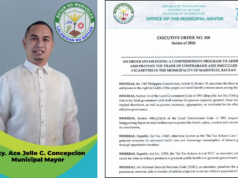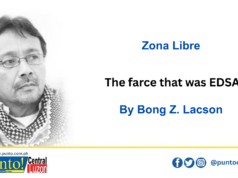FLAG UP. It was like a semester-long schooling for a two-day seminar on Basic Legal Competency training at the Manolo Lopez Development Center in Antipolo City.
Sponsored by the Center for Media Freedom and Responsibility (CMFR), I had the chance to join 24 other journalists (television, print, radio and web-based) from Luzon, Visayas and Mindanao in a virtual tour to the Philippine Legal System. It was spearheaded by a group of lawyers in Manila known as the Free Legal Assistance Group (FLAG).
Resource persons include lawyers Jose Manuel Diokno, Theodore Te, Leo E.D. Battad, Edgardo R. Abaya, Pura Calleja, Pablito Sanidad and Connie Veneracion.
COURTS. Atty. Battad, overall training coordinator for the seminar, first “toured” us to Philippine trial courts.
Aside from the common courts that I know like the Municipal Trial Courts, Regional Trial Courts, Supreme Court (SC), Court of Appeals, I learned that there are also other courts like the Shari’A District and Circuit Courts which hear various civil cases of Moslems.
Also, another court – the Small Claims Court – hears disputes involving payments of money where the value of the claim that does not exceed P100,000 (exclusive of interests and costs).
ON BONK. Like we often hear on TV, it is interesting to note that the term “En banc” (French for “in the bench”) should be pronounced as “on bonk” (on pronounced as an) and not “en bank”.
When an important issue is involved, the SC sits en banc, meaning, all the 15 justices are present and would vote to resolve the case. So if it happens that SC justices refer your case to a Division and refuse to sit en banc, then the case is of lesser importance or significance.
Since the SC is composed of 15 members, two thirds (2/3s) or eight members shall constitute a quorum of the Court en banc.”
WRITS. Atty. Diokno also talked about the different legal writs in the Philippines that include: the writ of amparo (shelter or protect); writ of habeas corpus (release), writ of habeas data (destroy, correct, divulge), writ of mandamus (compel), writ of prohibition (prohibit), writ of injunction (enjoin), and writ of certiorari (annul and set aside).
Legal writs basically protect our human rights and serve as judicial remedies. In case a person is missing (forced disappearance), his immediate relatives or even a concerned citizen could file for a writ of amparo any day and any time at any judicial court in the country free of charge (no docket fees). The writ is available to any person whose right to life, liberty and security is violated or threatened with violation with an unlawful act.
ON LIBEL. For years, I thought that getting the side of an accused keeps journalists away from being sued for libel.
However, Atty. Te says if the statement of the accuser or the story per se is defamatory, then a journalist could be charged of libel. However, getting the side of an accused weakens the element of actual malice.
While there are defenses against libel, Atty. Diokno has advised journalists to: “1. Use Malacañang instead of GMA; 2. Contact the subject(s) of the story and include their reaction; 3. Critique the conduct or policy, not the person.”
LESSONS LEARNED. We should all be guided by the code of ethics in the performance of our duties as journalists.
Oftentimes, we think that our actions are legal, but remain unethical.
Sponsored by the Center for Media Freedom and Responsibility (CMFR), I had the chance to join 24 other journalists (television, print, radio and web-based) from Luzon, Visayas and Mindanao in a virtual tour to the Philippine Legal System. It was spearheaded by a group of lawyers in Manila known as the Free Legal Assistance Group (FLAG).
Resource persons include lawyers Jose Manuel Diokno, Theodore Te, Leo E.D. Battad, Edgardo R. Abaya, Pura Calleja, Pablito Sanidad and Connie Veneracion.
COURTS. Atty. Battad, overall training coordinator for the seminar, first “toured” us to Philippine trial courts.
Aside from the common courts that I know like the Municipal Trial Courts, Regional Trial Courts, Supreme Court (SC), Court of Appeals, I learned that there are also other courts like the Shari’A District and Circuit Courts which hear various civil cases of Moslems.
Also, another court – the Small Claims Court – hears disputes involving payments of money where the value of the claim that does not exceed P100,000 (exclusive of interests and costs).
ON BONK. Like we often hear on TV, it is interesting to note that the term “En banc” (French for “in the bench”) should be pronounced as “on bonk” (on pronounced as an) and not “en bank”.
When an important issue is involved, the SC sits en banc, meaning, all the 15 justices are present and would vote to resolve the case. So if it happens that SC justices refer your case to a Division and refuse to sit en banc, then the case is of lesser importance or significance.
Since the SC is composed of 15 members, two thirds (2/3s) or eight members shall constitute a quorum of the Court en banc.”
WRITS. Atty. Diokno also talked about the different legal writs in the Philippines that include: the writ of amparo (shelter or protect); writ of habeas corpus (release), writ of habeas data (destroy, correct, divulge), writ of mandamus (compel), writ of prohibition (prohibit), writ of injunction (enjoin), and writ of certiorari (annul and set aside).
Legal writs basically protect our human rights and serve as judicial remedies. In case a person is missing (forced disappearance), his immediate relatives or even a concerned citizen could file for a writ of amparo any day and any time at any judicial court in the country free of charge (no docket fees). The writ is available to any person whose right to life, liberty and security is violated or threatened with violation with an unlawful act.
ON LIBEL. For years, I thought that getting the side of an accused keeps journalists away from being sued for libel.
However, Atty. Te says if the statement of the accuser or the story per se is defamatory, then a journalist could be charged of libel. However, getting the side of an accused weakens the element of actual malice.
While there are defenses against libel, Atty. Diokno has advised journalists to: “1. Use Malacañang instead of GMA; 2. Contact the subject(s) of the story and include their reaction; 3. Critique the conduct or policy, not the person.”
LESSONS LEARNED. We should all be guided by the code of ethics in the performance of our duties as journalists.
Oftentimes, we think that our actions are legal, but remain unethical.




